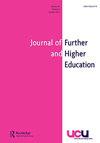Is hybrid teaching delivering equivalent learning for students in higher education?
IF 2.4
Q1 EDUCATION & EDUCATIONAL RESEARCH
引用次数: 0
Abstract
ABSTRACT Hybrid approaches to teaching, where there is a proportion of online (asynchronous or synchronous) teaching as well as face-to-face synchronous teaching, were adopted almost ubiquitously by UK higher education institutions throughout the 2020/2021 academic year amidst disruption caused by national and international Covid-19 restrictions. One example of this was the introduction and use of software such as Microsoft (MS) Teams as a learning tool and platform to continue education provisions. As such, this study reports on the implementation of MS Teams to deliver a foundation year physical science curriculum within a hybrid learning context over the 2020/2021 academic year and within multiple learning contexts. In-built data analytics from MS Teams were used to measure student engagement and activity on the software. Additionally, a questionnaire was used to capture student perspectives of MS Teams and their use as a learning tool. These data show that the like-for-like replacement of face-to-face teaching with an online alternative within this hybrid approach did not produce a clear like-for-like learning environment for students, except in the case of small-group collaborations where students found clear utility for the platform. Significant thought needs to be given to the use of online and hybrid alternatives to traditional face-to-face instruction and, in order to facilitate student learning and engagement effectively, a bottom-up approach to redesign may be required instead of simply substituting teaching tools.混合教学是否能为高等教育中的学生提供同等的学习?
摘要2020/2021学年,在国家和国际新冠肺炎限制造成的混乱中,英国高等教育机构几乎普遍采用混合教学方法,其中有一定比例的在线(异步或同步)教学和面对面同步教学。其中一个例子是引入和使用微软团队等软件,作为继续教育的学习工具和平台。因此,本研究报告了MS团队在2020/2021学年的混合学习环境中以及在多种学习环境中提供基础年物理科学课程的实施情况。微软团队的内置数据分析用于衡量学生对软件的参与度和活动。此外,还使用了一份问卷来捕捉学生对MS团队的看法及其作为学习工具的使用。这些数据表明,在这种混合方法中,用在线替代方案来代替面对面教学,并没有为学生创造一个明确的同类学习环境,除非是在小组合作的情况下,学生们发现了该平台的明显效用。需要认真考虑使用在线和混合替代传统面对面教学的方法,为了有效地促进学生的学习和参与,可能需要自下而上的重新设计方法,而不是简单地取代教学工具。
本文章由计算机程序翻译,如有差异,请以英文原文为准。
求助全文
约1分钟内获得全文
求助全文
来源期刊

JOURNAL OF FURTHER AND HIGHER EDUCATION
EDUCATION & EDUCATIONAL RESEARCH-
CiteScore
5.20
自引率
4.30%
发文量
80
期刊介绍:
Journal of Further and Higher Education is an international, peer-reviewed journal publishing scholarly work that represents the whole field of post-16 education and training. The journal engages with a diverse range of topics within the field including management and administration, teacher education and training, curriculum, staff and institutional development, and teaching and learning strategies and processes. Through encouraging engagement with and around policy, contemporary pedagogic issues and professional concerns within different educational systems around the globe, Journal of Further and Higher Education is committed to promoting excellence by providing a forum for scholarly debate and evaluation. Articles that are accepted for publication probe and offer original insights in an accessible, succinct style, and debate and critique practice, research, theory. They offer informed perspectives on contextual and professional matters and critically examine the relationship between theory and practice across the spectrum of further and higher education.
 求助内容:
求助内容: 应助结果提醒方式:
应助结果提醒方式:


